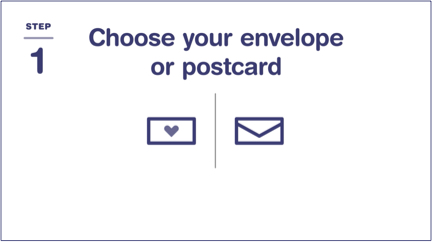
Sending a letter with USPS ® is easy! Our video will help you with most letters and postcards you send domestically (inside the U.S.), including U.S. territories and military bases in the U.S. and abroad. For how to ship a package, see How to Send a Package: Domestic.
Image of play button Find out how to send mail. 1:53
Envelopes are for sending flat, flexible things, like letters, cards, checks, forms, and other paper goods. For just 1 $0.73 First-Class Mail ® Forever ® stamp, you can send 1 oz (about 4 sheets of regular, 8-1/2" x 11" paper in a rectangular envelope) to anywhere in the U.S.! Show More
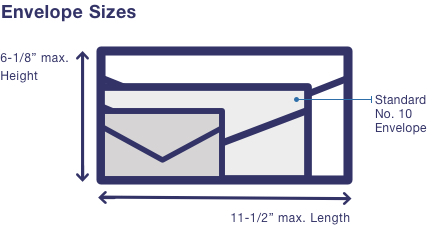
Envelopes must be rectangular and made of paper to qualify for letter prices. Your envelope can be a maximum of 11-1/2" long x 6-1/8" high. (A standard No. 10 envelope is 9-1/2" long x 4-1/8" high.) You can fold what you put in your envelope, but it needs to stay flat—no more than 1/4" thick. If you want to send letter-sized papers without folding them, you can use a large envelope (called a "flat"); the postage for flats starts at $1.50. If your large envelope is nonrectangular, rigid (can't bend), or lumpy (not uniformly thick), you'll have to pay the package price. TIP: If your envelope can't fit through USPS mail processing machines, or is rigid, lumpy or has clasps, string, or buttons, it's "nonmachinable" and you'll have to pay $0.46 more to send it. (See additional postage in Step 3.) You'll also have to pay more if your envelopes are square or vertical (taller than they are wide). Postcards are for short messages that you don't need to put in an envelope. Save money using a $0.56 postcard stamp to send a standard-sized postcard anywhere in the U.S. Standard postcards are usually made of paper, are between 5" to 6" long and 3-1/2" to 4-1/4" high, and are between 0.007" and 0.016" thick. Size & Weight Requirements – Postcards & Envelopes
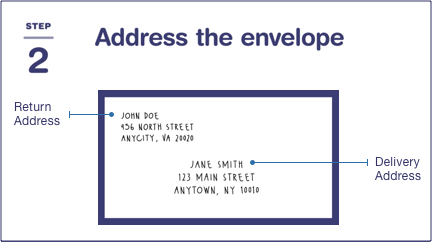
Envelopes: Write your address (the "return" or "sender" address) in the top left corner. Write the delivery address (the "recipient" address) in the bottom center. Postcards: Postcards come in different formats, so write the delivery address in the space it gives you (on the same side you write your message and put the stamp). Show More
Print your return address and the delivery address clearly, in the correct spots, to make sure your mail is delivered on time.
Write your address (the "return address") in the top-left corner. Include the following on separate lines:
Write the delivery address (the "recipient" address) in the bottom center of the envelope. Include the following on separate lines:
Some Puerto Rico addresses include an urbanization or community code for a specific area or development. Addresses with an urbanization code, abbreviated URB, should be written on 4 lines:
MS MARIA SUAREZ
URB LAS GLADIOLAS
150 CALLE A
SAN JUAN PR 00926-3232
Virgin Islands addresses have the same format as standard addresses. The right abbreviation for this territory is "VI," not "US VI" or "USA VI":
MS JOAN SMITH
RR 1 BOX 6601
KINGSHILL VI 00850-9802
SEAMAN JOSEPH SMITH
UNIT 100100 BOX 4120
FPO AP 96691
When you're done addressing your envelope, put what you're sending inside the envelope, then close and seal it (using the envelope's glue or tape).
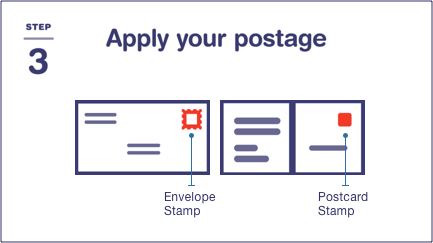
A First-Class Mail ® Forever stamp costs $0.73 and goes in the upper right corner of the envelope. (You can also use any combination of stamps that adds up to $0.73.)
If your letter is heavier or bigger, or if you want to add insurance or extra services like Certified Mail ® service, you'll pay more.
A standard postcard stamp costs $0.56. (Large or square postcards will cost more.) Put the postcard stamp in the space provided near the delivery address.
Postage for letters mostly depends on weight and size/shape. You can weigh your letter with a kitchen scale, postal scale, at a self-service kiosk, or at the Post Office ™ counter.
TIP: As a rule of thumb, you can send 1 oz (4 sheets of printer paper and a business-sized envelope) for 1 First-Class Mail ® Forever ® stamp (currently $0.73).
The postage for a large envelope (or flat) starts at $1.50 for 1 oz.
TIP: If you're sending larger envelopes (flats) using Priority Mail ® or Priority Mail Express ® service, you can use Click-N-Ship ® service to pay for and print your own postage online.
If your envelope weighs over 1 oz, you can buy additional postage in the amount you need:
TIP: Put the stamp on last; that way, if you make a mistake at any other point, you won't waste a stamp.
If you want insurance, proof of delivery, signature services, or other optional services, you'll have to pay extra.
Our Insurance & Extra Services page has more details; some of the more common add-on services for letters include:
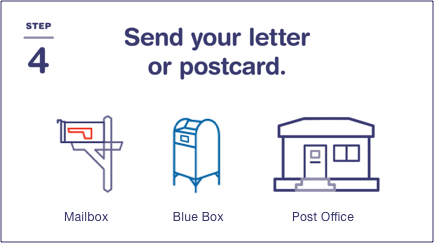
Once your envelope or postcard has the correct addresses and postage, you can send it several ways, including putting it in your mailbox or dropping it in a blue collection box or at a Post Office ™ location.
Important Note: If your envelope has postage stamps and weighs more than 10 oz or is thicker than 1/2", you can't put it in a collection box; you have to give it to an employee at a Post Office location. See more details on What Can and Cannot be Deposited in a Collection Box?
The Postal Service uses high-speed sorting machines to help process and deliver 425.3 million mail pieces each day. Here are some extra tips to improve your mail sending experience:
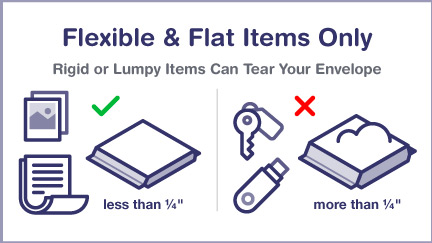
Postcards, letter envelopes, and large envelopes (flats) all need to bend to fit through USPS ® high-speed sorting machines.
Instead, for rigid and odd-shaped objects (or things you don't want to get bent), we recommend using a padded envelope or small box and sending it as a package.
If you want to send a specially decorated envelope (like some wedding invitations):
Tracking is not available for First-Class Mail items. If you'd like to get tracking information for your letter: